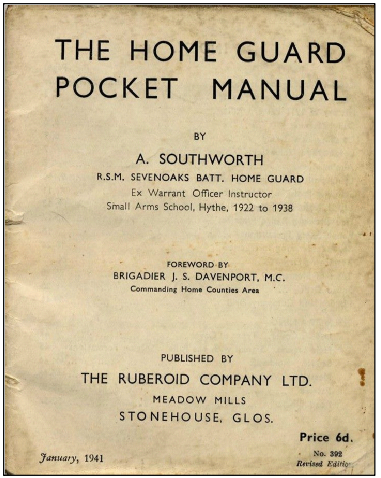


War comes to Eastington
Stephen Mills
It seems that throughout history, men have left their homes and marched off to fight in wars in some distant land. For centuries, towns and villages remained largely untouched by these foreign conflicts, and by and large, the people left at home carried on as normal. Sometimes men failed to return, but despite this, the life of the village continued as it had done so for centuries. The lives of villagers were rarely directly touched by battles far away, with many having only the vaguest idea of where countries were, encounters that took place, or even the reasons behind the conflict. However, with the 20th century came world wars, and particularly during WW2, with the arrival of attack from the air, everywhere was now at risk.
Air raids became a real threat and it was not uncommon to see or hear German bombers heading towards Bristol to attack its aircraft factories. These included the Bristol Aeroplane Company’s huge plants at Filton and Patchway (at one time, the largest aircraft production facility in the world), with smaller factories of Aero Engines Ltd in Kingswood, and Parnall Aircraft in Yate. An old Eastington resident remembered as a child, being wrapped in a blanket and taken into the garden at night to witness the baleful glow visible in the night sky over Bristol. Realistically, Eastington wasn’t that far so the fact that the village escaped largely unscathed was a blessing. But the German air force knew exactly where we were and what was located in the surrounding area. Aerial photographs found after the war clearly show our part of the world, particularly the Hoffmans ball bearing factory on the outskirts of Stonehouse and the Sperry Gyroscope works nearby at Bonds Mill. Both were producing vital components needed for the war effort. Fortunately, German activities were directed elsewhere, so the planned air raids never took place, but things could have been very different.
Ironically, there were several companies that relocated to Eastington in order to escape the threat of bombing. Probably the biggest was the Ruberoid Company that moved part of its manufacturing operations from Enfield into Meadow Mill some time before 1939. The company produced a wide range of building and roofing materials and during the war, developed bituminised hessian-based sheet material used to create temporary jungle airstrips. But nearer to home, their products were equally important for the upkeep of houses, farms and factories across the nation. Like most major employers in the area, they created their own section of the home guard. Sperry’s also relocated from Brentford to Bonds Mill to avoid possible air attacks, and Hoffman’s moved part of their operations from Chelmsford for the same reason.
Then there was the risk of invasion by land. To counter this, pill boxes were quickly erected at strategic points along local roads, the Stroudwater Canal and rivers. Many still remain, often lost in the undergrowth. For example, one lurks in the bushes by the river at the foot of Spring Hill. Despite these valiant efforts, it’s hard to imagine that they would have done much to hold the German army back for long. There were also other facilities built. At Cress Green, the remains of an unobtrusive brick building lie largely hidden in the hedgerow. This was one of a number built to house troops operating either searchlights or anti-aircraft guns that were dotted around the area to provide cover for the Hoffmans and Sperry plants, as well as for the Admiralty who also had a base in Stanley Mill at Ryeford. A searchlight was located at Cress Green, although at one point, it seems a Bofors anti-aircraft gun was also located there. At other times, particularly in the late Spring of 1944, village children raced to the A38 at Claypits to watch long convoys of American vehicles and troops rumbling southwards in readiness for the D-Day landings.
So, despite the fact that we were perilously close to Bristol, Eastington dodged the worst of the raids. However, that’s not to say that we escaped entirely as there were several occasions where air raids took place in the area or lone German bombers dumped their bombs en route home. A few landed in Eastington although as was usual at the time, newspaper reports omitted the name in case it inadvertently provided the Germans with useful information. On one occasion, a bomb hit Blunder Lock on the Stroudwater Canal, damaging the lock gates and blocking the canal. This may have happened at the same time that bombs were dropped elsewhere in the area. Reports noted that at around 3.30 am, a number of high explosive bombs were dropped around Coates, Ready Token and Eastington. No-one was hurt and the only damage occurred in Eastington where ‘electricity and telephone cables were severed and damage was done to a number of houses’.


A local newspaper dated 20 August 1940 reported the following
Casualty One Goose – Slightly Injured
On Tuesday morning an enemy aeroplane dropped 13 bombs on the outskirts of a south-west village (ed. - at 3.15 am in Eastington). Most of the bombs dropped in open fields or gardens, but one, which landed in a brook (ed. - thought to be near Millend), caused considerable damage to the windows and roofs of nearby cottages. Fortunately, there were no persons injured, the only casualty being one goose, which has a slight wound in the neck.
Several bombs fell near to the village church. A resident’s garden was one of the targets struck, and a number of tomato plants, the fruit of which were almost ready to be picked, were destroyed. A field in which a bomb landed had been used until the day before the raid for turning out cattle, but these animals has been moved and the field was empty.
A 63 years-old man, his wife and daughter all had very narrow escapes from injury when a bomb exploded near to their cottage and blew in the windows and damaged tiles on the roof. In an interview he told our reporter that he was sleeping in one bedroom and his wife and daughter in the other. The women were asleep when the plane went over, but he heard it. He remained in bed until a terrific explosion occurred. The window of his room was blown in, scattering glass all over his bed and the floor, but he was unscathed.
His wife and daughter had a similar experience in their bedroom, but apart from shock of the occurrence, neither of them was injured. They got up, lit a fire and had a cup of tea, and then started to clean up the mess. Most of the windows in the cottage and the adjoining one were badly damaged, tiles were blown off the roofs, and the back door was burst off its hinges, although it had been locked by means of a very strong bolt.
A woman who lives next door sustained severe shock, but otherwise, escaped injury. Other houses in the neighbourhood were also damaged, window panes being cracked and smashed and tiles being dislodged.
It gives an interesting insight to the British character – we get bombed by the mighty Luftwaffe, so what do we do? Simply make a cup of tea, clean up the mess and get on with our lives!





Eastington Community News Magazine. Community news for and by the people of Eastington, Gloucestershire

| Parish Council News |
| District council News |
| Council links |
| Village Agent |
| West of Stonehouse (WoS) |
| Ecotricity |
| Eastington Primary School |
| Playgroup |
| For the Little Ones |
| St Michaels Anglican Church |
| Eastington Methodist Church |
| Ladies of Eastington |
| ECO (Orchard Group) |
| PROWD & Walking Group |
| Slimming World |
| Snakey Park |
| War Comes to Eastington |
| Phone Box |
| Autumn Veg and Flower show |
| Eastington Horse Show |
| The Yard Trail |
| Poppy Appeal |
| Home Start |
| Halloween Walk |
| Parish Apple Day |
| Community Cinema |
| Activities nearby |